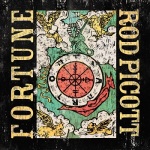 After reviewing Rod Picott’s seventh album, “Fortune”, I discovered that he was playing Green Note as part of the run-up to his Celtic Connections show with Kimmie Rhodes on January 25th. It was late notice, and the gig was sold out, but somehow I just managed to squeeze in and I’m really pleased that I did. I have a huge admiration for these artists, like Rod Picott, who travel from town to town and bare their souls on stage with only a guitar for protection. I particularly admire American artists who tour this way in the UK, where it’s sometimes impossible to tell if the audience like you or not.
After reviewing Rod Picott’s seventh album, “Fortune”, I discovered that he was playing Green Note as part of the run-up to his Celtic Connections show with Kimmie Rhodes on January 25th. It was late notice, and the gig was sold out, but somehow I just managed to squeeze in and I’m really pleased that I did. I have a huge admiration for these artists, like Rod Picott, who travel from town to town and bare their souls on stage with only a guitar for protection. I particularly admire American artists who tour this way in the UK, where it’s sometimes impossible to tell if the audience like you or not.
Slipping on to the stage unannounced, he set out the plan of action for the night; a bunch of songs from “Fortune” to open up with, then some older songs and maybe a few requests. He had a setlist prepared, but there was a suspicion that it wasn’t set in stone; it wasn’t. After the opening “Maybe That’s What it Takes” and “Elbow Grease”, it was obvious that the set would unfold in its own way regardless of any planning.
Rod’s economical (sometimes laconic) lyrical style and his powerfully emotional vocals work perfectly in this room, but his secret weapon is his engaging and self-deprecating manner as he spins out anecdotes between songs. Some are amusing, some are laugh-out-loud and some are poetic (he sums up perfectly the elemental nature of Howling Wolf with the words ‘he looks like he’s the weather’), but they all help to create an intimacy between the audience and performer.
There are no half measures with Rod Picott; his songs are intense and he gives full value when he delivers them live, veins bulging and sinews straining as he wrings the maximum emotion out of each song. It’s sometimes hard to reconcile the laid-back raconteur and impassioned troubadour, but he makes the contrast work for him, gradually building a rapport with a fairly reserved Green Note audience.
There’s a selection of material from right across Rod’s career and the highlights include the rocking “65 Falcon”, “410”, “Welding Burns” and “Mobile Home” (which includes a Bowie reference in the lyrics). From the new album, the menacing “Uncle John” stands out alongside “Until I’m Satisfied”, which prompts a confession that the chord progression it’s based on is the same as the Eddie Cooley and Otis Blackwell classic, “Fever”. Each song is a perfect little story of blue collar delivered with power and passion; you can’t really ask for more than that.
 I think we need to introduce a new way of evaluating Country and Americana albums. The five star system’s all very well but I think we need another measure. I’m thinking of something like the Kimbrough Count; if Will Kimbrough plays on the album then it’s worth listening to. It certainly worked last year with his appearances on albums by Dean Owens and Sam Lewis, and he shows up again here on Rod Picott’s seventh album “Fortune”, but this is a very different proposition to the albums by either of those artists.
I think we need to introduce a new way of evaluating Country and Americana albums. The five star system’s all very well but I think we need another measure. I’m thinking of something like the Kimbrough Count; if Will Kimbrough plays on the album then it’s worth listening to. It certainly worked last year with his appearances on albums by Dean Owens and Sam Lewis, and he shows up again here on Rod Picott’s seventh album “Fortune”, but this is a very different proposition to the albums by either of those artists.
Rod Picott’s songs are intensely personal, zooming in on the lives of ordinary people (Rod included) and everyday events, and delivered in a gruff baritone that often sounds on the point of cracking, but never actually does. More often than not, he performs with just his own acoustic guitar for backing, but, on “Fortune”, he’s added a smattering of musicians including Will Kimbrough and Neilson Hubbard to create a sound that’s still sparse, stark and sometimes downright menacing and intimidating. It’s still a fairly minimal soundscape but it reinforces the powerful lyrics which are poetic but never overblown.
“Uncle John” is slightly untypical in that it deals mainly with family and society rather than personal matters, but the instrumentation is unsettling with detuned guitar, clipped notes, harmonics, heavy reverb and a sound somewhere between Dick Dale and Link Wray all underpinning a story of an outsider woodsman who pays the ultimate price for stepping outside society. The two lines ‘Drinks his beer from a can cause bottles break, Nine fingers from one mistake’ paint a graphic and economic picture of the lifestyle and its dangers, while the closing lines (along with the chorus) imply his death without actually making the statement.
The themes of the songs are mainly personal (although “Jeremiah” is written from the point of view of a woman hearing about the death of a soldier she loved), but it’s the moments when Rod steps back from dealing with raw emotion to singing about more general themes, particularly “Uncle John” and the moodily magnificent “Drunken Barber’s Hand” that the album really starts to soar. The album’s full of powerful, gut-wrenching songs that evoke the spirit of heartland America with imagery and playing that are equally powerful and simple. 2016’s looking good already.
“Fortune” is released in the UK on Friday January 15th on Welding Rod Records.


